The Federal Republic of Germany (FRG) is a Central European country and member of the European Union, G4, G7, the G20, the Organizations for Economic Co-operation and Development and the North Atlantic Treaty Organization (NATO). It maintains a network of 229 diplomatic missions abroad and holds relations with more than 190 countries. As one of the world's leading industrialized countries it is recognized as a major power in European and global affairs.

Goethe University Frankfurt is a public research university located in Frankfurt am Main, Germany. It was founded in 1914 as a citizens' university, which means it was founded and funded by the wealthy and active liberal citizenry of Frankfurt. The original name in German was Universität Frankfurt am Main. In 1932, the university's name was extended in honour of one of the most famous native sons of Frankfurt, the poet, philosopher and writer/dramatist Johann Wolfgang von Goethe. The university currently has around 48,000 students, distributed across four major campuses within the city.

The Alexander von Humboldt Foundation is a foundation that promotes international academic cooperation between select scientists and scholars from Germany and from abroad. It was established by the government of the Federal Republic of Germany and is funded by the Federal Foreign Office, the Federal Ministry of Education and Research, the Federal Ministry for Economic Cooperation and Development as well as other national and international partners.

Germany–Iceland relations are the bilateral relations between Germany and Iceland. Both countries are also members of the OECD, the OSCE, the CBSS and the Schengen Area.
The Hans-Bredow-Institut for Media Research at the University of Hamburg (HBI) is an independent non-profit foundation with the mission on media research on public communication, particularly for radio and television broadcasting and other electronic media, in an interdisciplinary fashion.

Michael Helmut Roth is a German politician of the Social Democratic Party of Germany (SPD) who has been serving as a member of the German Bundestag since 27 September 1998.

Germany–Morocco relations date back to the 19th century. The German Foreign Office describes Morocco as a "central partner of the European Union and Germany in North Africa," and Germany is an important trading partner for Morocco. In the past, however, relations have not always been entirely free of tension.
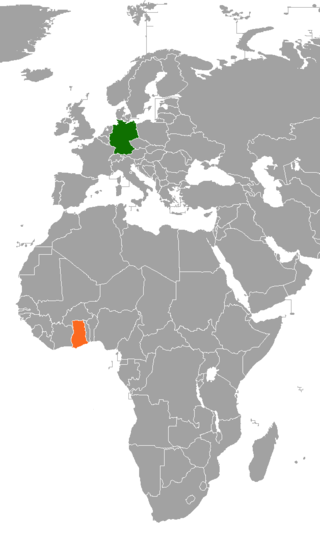
Germany–Ghana relations are good and Ghana is one of the priority countries for German development aid. Official Diplomatic Relations between the two countries were established in the 1950s, but contacts between the two societies go back much further and can be traced back to the 17th century.

Germany–Somalia relations have intensified since 2012 after the political and security situation in Somalia improved, according to information from the German Foreign Office. Germany has not had an ambassador to Somalia since 1989, and the German Ambassador in Nairobi is responsible for relations with Somalia instead.

Democratic Republic of the Congo–Germany relations are primarily characterized by the development aid that Germany provides in the DR Congo. Germany is one of the most important donor countries to the DR Congo.

Cameroon–Germany relations are described as "good" by the German Foreign Office. The two countries share a long common history and Cameroon was a colony of Germany from 1884 to 1918. Also due to German involvement in development cooperation, Germany is "positively perceived" in the country today.

Germany–Venezuela relations have a long tradition and were officially established in 1871. During Nicolás Maduro's tenure, relations have deteriorated and in 2019 Venezuela declared the German Ambassador Daniel Kriener a persona non grata; however, he was able to return to the country soon after. Close relations with Venezuela continue to be maintained by parts of the German left and the political party Die Linke.

Germany–Rwanda relations are good and there is a "close and pragmatic" relationship between the two countries, according to the German Foreign Office. In the 21st century, Germany is one of the most important donors of development aid to Rwanda.
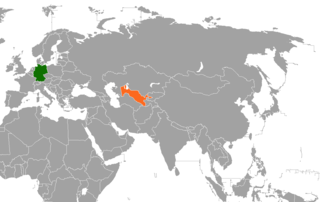
Germany–Uzbekistan relations are the diplomatic relations between the Federal Republic of Germany and the Republic of Uzbekistan. Bilateral relations began when the Federal Republic of Germany recognized the independence of the Republic of Uzbekistan on December 31, 1991.
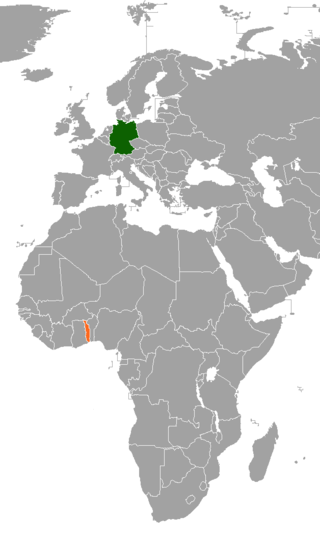
Germany–Togo relations are shaped by the shared past of both countries. From 1884 to 1914, Togo was a colony of Germany under the name of Togoland.

Germany–Tajikistan relations are the diplomatic relations between Tajikistan and Germany.
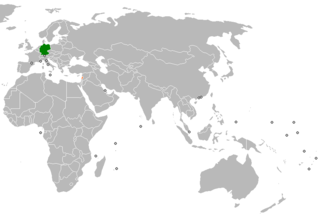
Germany–Lebanon relations are "traditionally friendly" and "very close", according to the German Foreign Office. For Lebanon, Germany is one of the most important donor countries for the care of the numerous refugees in the country. Among the Arabs in Germany, the Lebanese are among the largest groups with almost 160,000 members (2021).

Germany–Madagascar relations are "traditionally friendly", according to the German Foreign Office. Diplomatic contacts have been maintained between the two countries since the 19th century. In the 21st century, relations between the two countries are predominantly characterized by development cooperation.
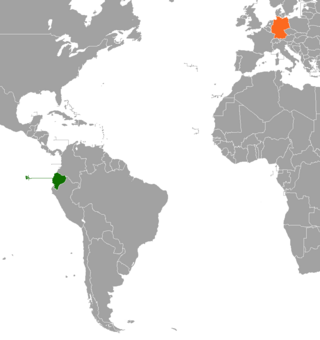
Ecuador–Germany relations have existed since 1922, and in the 21st century they focus on development cooperation, environmental policy, trade and investment and education.

Germany–Laos relations have existed on the bilateral level since the late 1950s.


















